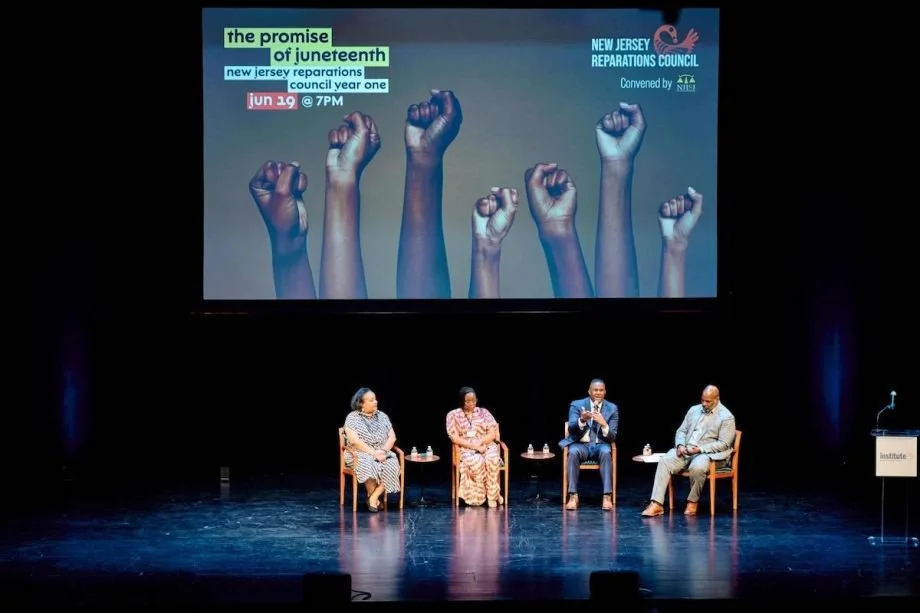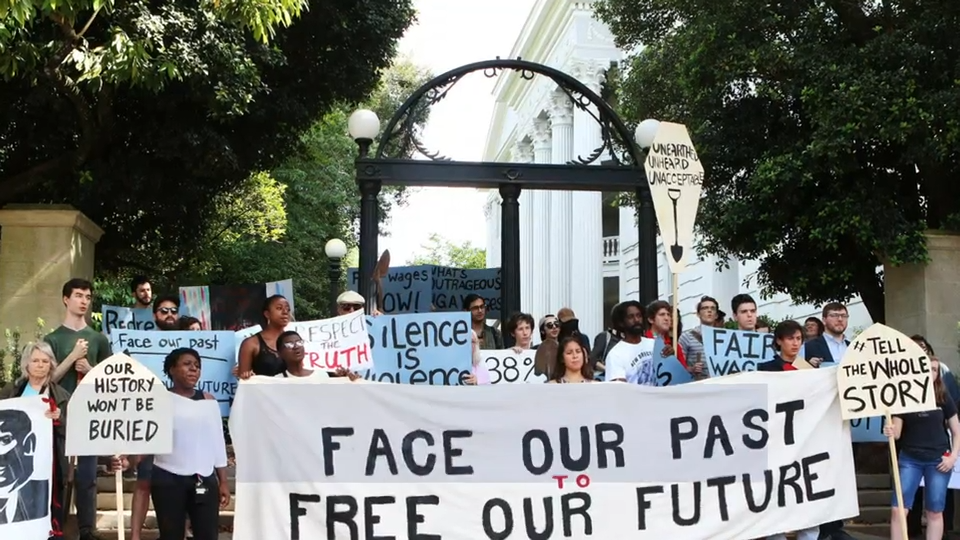Reparations
A List of Four Reparations Movements From Around the United States - New Initiatives and Updates to Existing Initiatives
A Black Lives Matter sign posted on the grass in Evanston, IL sometime in 2020. This image is from a 2023 PBS NewsHour segment on Evanston titled A look at the nation's first cash reparations program
Local movements for reparations continue to grow and we are committed to covering the progress. Last year we highlighted four reparations projects here. Today we’d like to revisit some of those, and shine a light on a few others.
Why Local Reparations?
The social and economic impacts of slavery and systemic racism persist. Because of this, so do local community conversations around reparations. Even when this subject is not in the national news, it is very much a topic of concern for communities across the country.
While federal reparations remain elusive, cities, activists, and local governments continue to pursue actions that might fill in the gap in efforts to address historical injustices and persistent systemic inequities.
Looking Ahead
Let's examine a few reparations initiatives from around the country. Some are new on the scene, others have been years in the making. Either way, we’ll provide updates on progress and highlight challenges cropping up on the many paths toward reparations.
Tulsa, Oklahoma:
New Reparations Commission Established in 2024:
In August 2024 the city of Tulsa, Oklahoma established a commission to study reparations for the victims of the 1921 Tulsa Race Massacre and their descendants. The commission will examine various forms of reparations, including financial payments, housing equity programs, and public apologies.
How They Got Here:
The formation of this commission is due in part to a 2023 report for the city and a 2001 report by a state commission on the 1921 Tulsa Race Massacre. Both the 2023 report and the 2001 report call for financial reparations to the victims and their descendants.
The 1921 massacre occurred when a white mob killed as many as 300 Black residents of Tulsa and burned the city’s historically Black Greenwood District to the ground. It is material to note that the mob acted with the explicit support of Tulsa city officials at the time. It took place over 24 hours and decimated the vibrant Greenwood District, previously nicknamed “Black Wall Street” because of the many prosperous Black-owned businesses within its boundaries.
Challenges At Hand:
Two Tulsa Race Massacre survivors, Viola Fletcher and Lessie Benningfield Randle, have faced a lifetime of trauma and financial hardship due to the 1921 event. Despite decades of seeking justice, they have been unable to hold any individual or institution accountable for the injuries and losses they suffered. The recent Oklahoma Supreme Court ruled in June, 2024, to dismiss their claims for compensation. While this blow represented a significant setback in the pursuit of justice, the formation of the reparations commission signals efforts to continue the push for redress.
This initiative is just one of many national conversations taking place that acknowledge the importance of facing our history and rectifying systemic racism in the United States. We will continue to pay attention to this initiative and bring updates when we can.
Further Reading:
ICTJ, August 8, 2024: Tulsa Commission Will Study Reparations for 1921 Race Massacre Victims and Descendants
NY Times, August 3, 2024: Tulsa Creates Commission on Reparations for Race Massacre
Tulsa World, August 13, 2024: City's Effort to Create Commission on Possible Redress for 1921 Tulsa Race Massacre Advances
State Court Report June 21, 2024: Oklahoma Supreme Court Rejects Reparations for Tulsa Race Massacre.
Greenwood District of Tulsa, OK in 2024
Newark, New Jersey:
New Jersey confronts the legacy of a state deeply entangled with slavery.
Despite a legislative bill proposing a reparations task force stalling for years, local advocates haven't waited. As reported by Next City, the New Jersey Reparations Council, convened by the New Jersey Institute for Social Justice, is actively researching solutions and will make recommendations in 2025.
How They Got Here:
In the 1920s, federal redlining, fueled by racist sentiment and the legacy of slavery, targeted Black communities in Newark and surrounding areas. This discriminatory practice denied Black residents access to essential resources, reinforcing segregation and perpetuating economic disparities. Despite progress made in recent decades, these inequalities persist, with Black households in Essex County facing significant challenges in homeownership and poverty rates. In a state formerly known as “the slave state of the North”, activists have decided to take matters into their own hands.
Where They Are Headed:
Convened by the New Jersey Institute for Social Justice (NJISJ), a nonprofit advocacy organization, the New Jersey Reparations Council came together on Juneteenth 2023 to launch a two-year study. This independent council aims to be the first comprehensive effort on a statewide level to acknowledge the lasting harm of slavery on Black New Jersey residents. Their work focuses on proposing bold policy recommendations, potentially including education initiatives, healthcare access improvements, and economic empowerment programs, to dismantle the structures that perpetuate racial inequality.
Challenges At Hand:
Like so many reparations initiatives that have come before it, this independent council faces challenges including how to fund reparations, how to determine who would be eligible to receive them, and how to translate their research into state and local law. But like other initiatives around the country, they come to the work with a commitment to healing and Black prosperity. According to Jean-Pierre Brutus, senior counsel at NJISJ, the group explores these questions and more with an “abundance mindset.”. Here at Civility Localized, we think that’s special and will keep you posted as this initiative develops.
Further Reading:
Next City, August 2024: New Jersey’s Legislature Stalled Reparations Inquiry For Years. Local Advocates Picked Up the Slack
PBS June 2023: Juneteenth Rallies Highlight the Past and the Future
Asheville, NC:
Asheville's Reparations Commission Makes Strides with Economic and Social Equity Proposals
Important updates have come out of the city of Asheville, NC in 2024. The Asheville Reparations Commission has been busy formulating concrete recommendations to address racial inequities. Remember, the ARC was formed back in 2020 after several years of planning.
How They Got Here:
In December, 2022 Civility Localized was there when the commission passed its Stop the Harm recommendation, prompting the City of Asheville and the County of Buncombe to audit processes for racial bias and harm. That third party audit was conducted by the Carter Development Group and it included 108 recommendations. While the audit found the city and county were in compliance with federal and state laws, it also identified areas where harm to the Black community was still occurring and areas where they could improve racial equity. Some of those areas included insufficient data-driven pracites, insufficient evaluation of grant recipients, limitations on affordable housing, and lack of racial equity training for staff. Auditors recommended remedies including establishing a Black Chamber of Commerce, improving data collection, and creating a one-stop shop for Black community resource.
New Developments:
In May 2024 the Asheville Reparations Commission presented their proposals to the public. These included the creation of an Economic Development Center meant to be a "one-stop shop" to resources for building Black wealth, and targeted investments in historically Black neighborhoods.
Other recommendations included a proposal for a Guaranteed Income Pilot Program. This program would provide direct cash payments to low-income Black residents. Proposal supporters cite similar to initiatives in Durham, NC and 100 other cities. This approach aims to directly address the economic disparities created by systemic racism. Commission documents state it would “fund a guaranteed income program as a way to ensure basic needs are met for individuals with low-income and assets.”.
Challenges At Hand:
These proposals are not without contention, yet they signify an important step forward for Asheville's reparations efforts. While final decisions on implementation lie with the city council and county commissioners, the Reparation Commission's work offers another example of key learnings on designing reparations initiatives at the local level. Stay tuned for further updates on the commission's progress and how Asheville chooses to move forward with these impactful recommendations.
Further Reading:
WLOS by Kimberly King, May 7, 2024: Reparations commission suggests economic projects for Asheville's Black community
WLOS, by Neydja Petithomme May 17, 2024: Reparations Commission Issues New Recommendations
WLOS, by Kimberly King, May 9, 2024: Community reparations: What would a cash payment program look like?
Evanston, IL:
Leading the Way with Direct Payments:
In 2019 Evanston, Illinois made history by becoming the first city in the United States to approve a reparations program. The city council allocated $10 million to fund reparations, with a focus on addressing the harms of housing discrimination.
Where Are They Now?
As of 2024, Evanston has begun distributing reparations in the form of $25,000 grants to eligible residents. These funds can be used for a variety of purposes, including homeownership, repairs, and business start-ups. While the program has faced challenges, such as limited funds and proving eligibility criteria, it represents the power of creative activism and local government. This proactive initiative is being studied as a first-of-its-kind local reparations initiative aimed at redressing historical wrongs.
In August 2024 the City of Evanston's Reparations Committee released a statement detailing progress. As of August 16, 2024, over $1 Million had been disbursed through the Local Reparations Restorative Housing Program to eligible residents. The committee had already met with 76 out of 140 verified Ancestor reparations recipients. To honor reparations beneficiaries, the City has also hosted a series of special thank you and acknowledgment dinners. The commission is on pace to distribute an additional $439,397 pending disbursement for mortgage assistance and construction projects.
Challenges At Hand:
In 2024, the Evanston Reparations Initiative was challenged in a lawsuit brought by the conservative legal group Judicial Watch. The suit claims the fund discriminates against non-black residents.
As of September 2024, the lawsuit challenging Evanston's reparations program remains ongoing. The case continues to be closely watched as it tests the boundaries of local government's ability to address historical injustices.
Further Reading
PBS.org June 16, 2024: What to know about a conservative lawsuit against reparations in Evanston, Illinois
News WTTW, June 5, 2024: Evanston’s Groundbreaking Reparations Program Faces Class Action Lawsuit
City of Evanston, August 16, 2023: City Distributes Over $1 Million in Reparations Funding
Atlanta Journal-Constitution, 2021: Illinois City Becomes First in Nation to offer Reparations to Black Americans
As the local reparations movement continues to gain momentum, cities and communities across the United States are taking proactive steps to address the lasting legacies of systemic racism. From healthcare and small business support to housing initiatives and public acknowledgments, these efforts demonstrate a solid recognition of the need for restorative justice.
While challenges persist, the progress made in cities like Evanston, Tulsa, Newark, and Asheville offer hope for a future where historical injustices are redressed. As we continue to follow these initiatives, we remain committed to highlighting the ongoing struggle for reparations and the innovative solutions developed by communities nationwide. Has your community considered Reparations? We want to hear about it via all social channels. Shining a light on these types of local government initiatives is part of building momentum.





